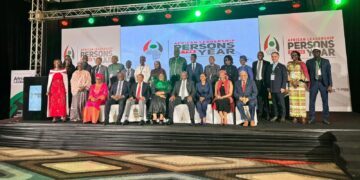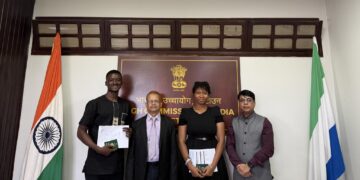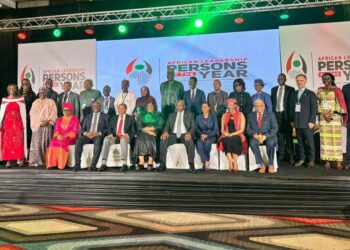By Alpha Amadu Jalloh
In recent days, some Sierra Leoneans, particularly on social media, have been calling for an improbable “exchange” between a man known as “Adebayo,” who has been granted asylum in the Netherlands, and an alleged international fugitive, Jos Leijdekkers. According to these voices, Sierra Leone should somehow negotiate to have Adebayo repatriated in exchange for providing assistance or custody related to Mr. Leijdekkers, a scenario that is not only impractical but also fundamentally at odds with international law, Interpol regulations, and the responsibilities Sierra Leone holds under various United Nations (UN) protocols. As both a sovereign state and a signatory to critical international treaties, Sierra Leone cannot simply disregard its obligations without risking serious diplomatic and legal ramifications.
I am seeking to clarify why Sierra Leone has no legal or moral ground to undertake such an exchange. It will delve into the fundamentals of international refugee protection, discuss the protocols and treaties governing states’ responsibilities regarding drug trafficking and human trafficking, and explore how Interpol’s framework would factor into such matters. These international agreements form a legal and moral compass that nations, including Sierra Leone, are bound to follow.
Understanding the Context: Calls for an “Exchange.”. The calls for exchanging Adebayo for Leijdekkers stem from a misunderstanding of international law and a failure to grasp the complexities surrounding refugees, extradition requests, and international criminal cooperation. Although some pundits or “bloggers” in Sierra Leone might believe this to be a simple matter of quid pro quo, the reality is layered with binding obligations and protocols that a country like Sierra Leone, keen to maintain its standing in the international community, cannot simply cast aside.
Did Sierra Leone ever declare Adebayo a wanted man? By all accounts, there is no record of Adebayo having been charged or convicted in Sierra Leone. If an individual is not subject to a legitimate arrest warrant at the national level, it is virtually impossible to request their extradition or “exchange.”
Has Adebayo committed any crime under Sierra Leonean law? Once again, there is no public evidence that Adebayo has breached Sierra Leonean law. Without evidence of a crime, no recognized extradition procedure would even begin.
Was Adebayo granted asylum based on Sierra Leone’s stance? Reports suggest Adebayo was granted asylum by a state that deemed his claims credible under the 1951 Refugee Convention and the 1967 Protocol Relating to the Status of Refugees.[1] These conventions enshrine the principle of non-refoulement, which bars returning a refugee to a territory where they may face persecution.
Thus, the entire notion that Sierra Leone could or should “exchange” this individual for an alleged international criminal is deeply flawed. States simply do not trade asylum seekers like commodities.
The Principle of Non-Refoulement, At the heart of these discussions lies one of the most fundamental principles in international refugee law: non-refoulement. Enshrined in Article 33 of the 1951 Convention Relating to the Status of Refugees, non-refoulement prohibits the expulsion or return (“refouler”) of a refugee “in any manner whatsoever” to the frontiers of territories where their life or freedom would be threatened.[1]
By granting someone asylum, a host country establishes its belief that the individual faces genuine harm if returned to their country of origin. Any attempt to force or coerce that individual back to the country they fled would violate this principle. Sierra Leone, as a signatory, has a responsibility to uphold non-refoulement. Failing to do so not only tarnishes its international reputation but also invites legal challenges and possibly sanctions.
UN Protocols on Trafficking and Transnational Organized Crime. Sierra Leone is a signatory to numerous United Nations protocols aimed at combating transnational organized crime, including the sale and trafficking of drugs and human beings. Among these are:
The United Nations Convention against Transnational Organized Crime (UNTOC), 2000
The Protocol to Prevent, Suppress, and Punish Trafficking in Persons, especially Women and Children (“Palermo Protocol”), 2000 [2]. The Protocol against the Smuggling of Migrants by Land, Sea, and Air, 2000
These protocols obligate participating states to cooperate in investigating and prosecuting crimes such as human trafficking, drug trafficking, and other forms of transnational organized criminal activity. The commitment to combat these crimes is not merely rhetorical; it comes with stringent requirements for judicial cooperation, intelligence sharing, and respecting human rights standards.
Crucially, these protocols also require states to adopt victim-centered approaches. In cases of trafficking or smuggling, states must protect, rather than endanger, individuals who might be persecuted elsewhere. If Adebayo were at risk of persecution or harm in Sierra Leone, any attempt to extradite or “swap” him in violation of the non-refoulement principle would directly contradict both the spirit and the letter of these international agreements.
Interpol and Its Limitations. Interpol, the International Criminal Police Organization, provides a platform for police cooperation across the globe. However, Interpol is bound by its Constitution’s Article 3, which strictly forbids the organization from undertaking any intervention or activities of a political, military, religious, or racial character.[3] Even if an individual like Adebayo were the subject of a “Red Notice,” the notice itself is not an arrest warrant. It merely requests that member countries locate and provisionally arrest a person pending extradition.
In the hypothetical scenario that Leijdekkers is wanted on drug trafficking charges, Sierra Leone might be requested to provide information or assist with his capture, should he be in or linked to Sierra Leonean territory. Yet, Interpol’s involvement does not automatically grant the legal basis to “swap” a wanted suspect for an asylum seeker. Extradition and asylum decisions are complex legal processes determined by treaties, domestic legislation, and judicial scrutiny, not by bartering.
Moreover, Sierra Leone’s compliance with Interpol obligations must still respect the fundamentals of the rule of law and due process. If an individual is not criminally wanted, Interpol’s framework provides no legal avenue to forcibly return them to any country.
Responsibilities of States Under international law, Sierra Leone’s responsibilities under these various international instruments can be summarized as follows:
Respect for Non-Refoulement, As a signatory to the 1951 Refugee Convention, Sierra Leone must ensure it does not return or help return an asylum seeker to a jurisdiction where they may face persecution.
Cooperation in Combating Transnational Organized Crime: Sierra Leone should, in principle, cooperate with international efforts to stop drug trafficking, human trafficking, and related offenses. This cooperation must be in line with due process and established extradition frameworks. It does not, however, permit extrajudicial or politically motivated “exchanges.”
Adherence to Due Process and Rule of Law: Any request for extradition must follow legal protocols, including the presentation of evidence, judicial oversight, and respect for human rights. The principle of aut dedere aut judicare, “extradite or prosecute,” often comes into play, but Sierra Leone has no basis to prosecute someone (like Adebayo) who has not been charged with a criminal offense under its jurisdiction.
Protection of Asylum Seekers, If an individual has been granted asylum in another jurisdiction, Sierra Leone must respect that country’s legal decision. Engaging in a forced exchange could expose Sierra Leone to international condemnation and potential legal disputes.
The Dangers of Misguided Social Media Campaigns, A troubling aspect of the debate has been the role of social media personalities, some self-styled as “bloggers” or “social commentators,” who have championed the idea of an exchange without the slightest grounding in international law. Their rhetoric does a disservice to the public by cultivating false hopes and misconceptions about what is legally and diplomatically possible.
When individuals or groups lacking basic legal knowledge spread such narratives, they risk:
Misleading the public about Sierra Leone’s obligations and potential liabilities.
Sowing discord by framing the issue as a simple matter of political will rather than legal impossibility. Damaging Sierra Leone’s international standing by making it appear that the country is willing to sidestep its legal responsibilities.
Indeed, some of these commentators may be motivated by domestic politics, seeking to show loyalty to certain political figures or to stoke nationalistic sentiments. However, these short-term gains pale in comparison to the long-term diplomatic harm that would result from reneging on international agreements.
Political Figures and Punditry, It is noted that certain high-profile individuals or associations claim to defend the “first family” in Sierra Leone. Yet, even among these defenders, there seems to be little understanding of the complexities of international legal obligations. Some might recall that Dr. Sylvia Blyden has been vocal in going after various officials on different matters, but even she has not ventured to support the notion of these “Jos Leijdekkers.” The silence might be telling; it signals a recognition, whether spoken or not, that “Leijdekkers” is a legal dead end and a political liability.
Sierra Leone’s Interests and the Way Forward. From a strictly pragmatic standpoint, Sierra Leone has much to lose and very little to gain by attempting to circumvent international law. The country benefits significantly from international partnerships, whether through foreign aid, investment, or diplomatic support. Violating core principles like non-refoulement would risk:
Straining Diplomatic Relations. Countries that uphold human rights rigorously might re-evaluate their relationship with Sierra Leone if it appears willing to engage in forced returns or illegal exchanges of an asylum seeker for a convicted drug lord.
Jeopardizing International Funding. Many international aid packages are conditional on adherence to human rights standards. Breaching these standards could result in loss of funding critical for health, education, and infrastructure projects in Sierra Leone.
Potential Legal Action. Non-governmental organizations (NGOs) and international bodies might initiate legal or diplomatic action to sanction Sierra Leone if it contravenes treaties it has ratified.
Given these risks, it is in the country’s best interest to adhere to established legal pathways. If there are legitimate charges against Leijdekkers, the correct procedure involves cooperation with the requesting state’s law enforcement under recognized extradition treaties or mutual legal assistance frameworks, which Sierra Leone is obligated to.
Sierra Leoneans. The idea that Sierra Leone could “swap” Adebayo, who has not been declared a criminal by Sierra Leone, for an alleged drug trafficker like Jos Leijdekkers is legally and morally untenable. It disregards the principle of non-refoulement under the 1951 Refugee Convention and the 1967 Protocol, as well as Sierra Leone’s obligations under UNTOC and the Palermo Protocol. It also overlooks Interpol’s constitutionally mandated political neutrality and the requirement for legitimate legal processes in extradition or repatriation.
In an era where international cooperation is paramount for tackling transnational crime, Sierra Leone cannot afford to jeopardize its standing by participating in extralegal maneuvers. As a signatory to numerous international treaties, the nation is bound to uphold legal standards that protect human rights, respect due process, and foster cooperation in criminal matters within the framework of internationally recognized procedures.
Those calling for Adebayo’s forced repatriation or exchange fundamentally fail to grasp these realities. Their rhetoric is less a demonstration of patriotism than a reflection of a dangerous ignorance, one that can mislead the public, harm Sierra Leone’s reputation, and place the country at odds with powerful international actors.
Sierra Leoneans deserve clarity rather than confusion, and upholding international norms should remain the cornerstone of the country’s foreign and domestic policy. Only by adhering to its obligations and engaging responsibly with the global community can Sierra Leone maintain its respectability and continue to protect the rights and welfare of all who seek refuge within its borders or, indeed, outside of them.























